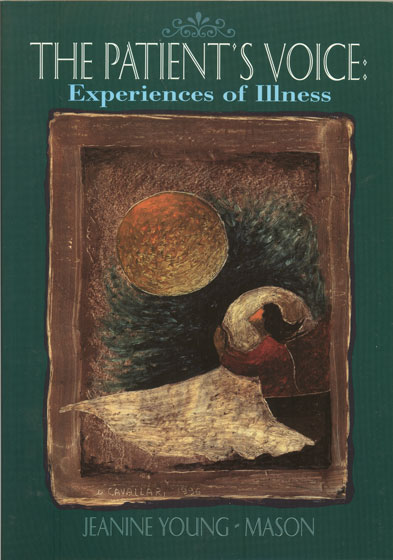The Patient's Voice: Experences of Illness
The Patient’s Voice: Experiences of Illness introduces contemporary autobiographical accounts of psychiatric and somatic illness to students in nursing, medicine, and allied health professions. The accounts, written expressly for this book, are of children’s and adults’ experience of illness. They emphasize the implications of illness and spiritual distress and the ways in which the individuals express their views of compassionate care. They portray the personal transformations which have evolved out of their suffering. The cover art was painted expressly for this book by Odino Cavallari of Paris and Sennevoy le Haut. The Japanese edition of the book and Teacher’s Manual, translated by Kyoko Nakamura, was published in Tokyo by Chikuma Gakugei Bunko, March 2001. Japanese title is no Koe Byouki No Taiken.
Professor Nakamura wrote in her afterward “If the Japanese reader finds in this book accounts the key to understanding others, and if that finding can be utilized in the professions of medicine, and nursing education, it would be the greatest pleasure for me to have introduced and translated the book.”
There are short narratives by children recounting experiences of long hospitalizations and lengthy treatments and surgeries, a memoir of an adult about the childhood experience of loss and sorrow through the death of his father, and others which chronicle the lingering effects of traumatic childhoods which have resulted in psychological problems and even psychosis. There are several accounts of the troubling experiences of chronic pain. One dramatic narrative is that of a lawyer who suffers from a genetic disease that has left him paralyzed. He has, however, mastered his life and teaches law and directs the disability services for Boston University. The book concludes with two accounts of the experiences of two women who cared for dying friends.
Ultimately, this book treats of the dynamic human story of these authors as they confront, and eventually come to at least a partial understanding of what illnesses have meant and means in their lives.
Cover art by Dino Calavari. Click here for more information.
Excerpt from The Patient’s Voice
“The Memory of Death”
by Herbert Mason
It is that inner atmosphere that has
An unfamiliar gravity or none at all
Where words are flung out in the air but stay
Motionless without an answer,
Hovering about one’s lips
Or arguing back to haunt
The memory with what one failed to say,
Until one learns acceptance of the silence
Amidst the new debris
Or turns again to grief
As the only source of privacy,
Alone with someone loved.
It could go on for years and years,
And has, for centuries,
For being human holds a special grief
Of privacy within the universe
That yearns and waits to be retouched
By someone who can take away
The memory of death.
Herbert Mason, Gilgamesh: a Verse Translation
Because the power of death yields in some of us such a longevity of grief, it is surely appropriate to include it among chronicles of illness. Indeed, grief, on a personal and collective scale, may be the most all-consuming, inescapable, and indecipherable of all illnesses suffered by humanity. I learned as a child of 7 at my father’s death that grief is shared with others and others’ tears can down out one’s own to the point where one can’t hear oneself or be heard. We are made suddenly fearful. And for those of us who view death as a tragedy, whether we laugh at it like the Irish of old or quietly weep like the ancient Mesopotamians with their distended eyes, it causes terror, such that only very gradually over time, over years, are we brought to rise up in frail but humanly heroic defiance of death’s power. Before heroism rises in us, this fearfulness results in some of the strangest, most bewildering behavior that human beings are capable of, much of it rooted in our competitiveness, possessiveness, and capacity for jealousy.
Instructor’s Guide for the Patient’s Voice: Experiences of Illness.
“’Listening and Responding to The Patient’s Voice’. The concentrated study of this text should be approached as an experience that will be made more accessible through the exercise of writing and reflection. The accounts should be thought of as an opportunity to converse with another who has had an experience that is to be shared…as with a companions met for the first time. These new companions have been, in some sense, victims but are now looking back, having found a way of living with illness that they wish to share with us.”
“This manual, then, approaches these accounts through close reading and provocative questions meant to stimulate classroom discussion and writing. The text is meant to be utilized in its entirely for semester-long courses in medical, nursing and allied health curricula or might be the foci of continuing education seminars and workshops.”
